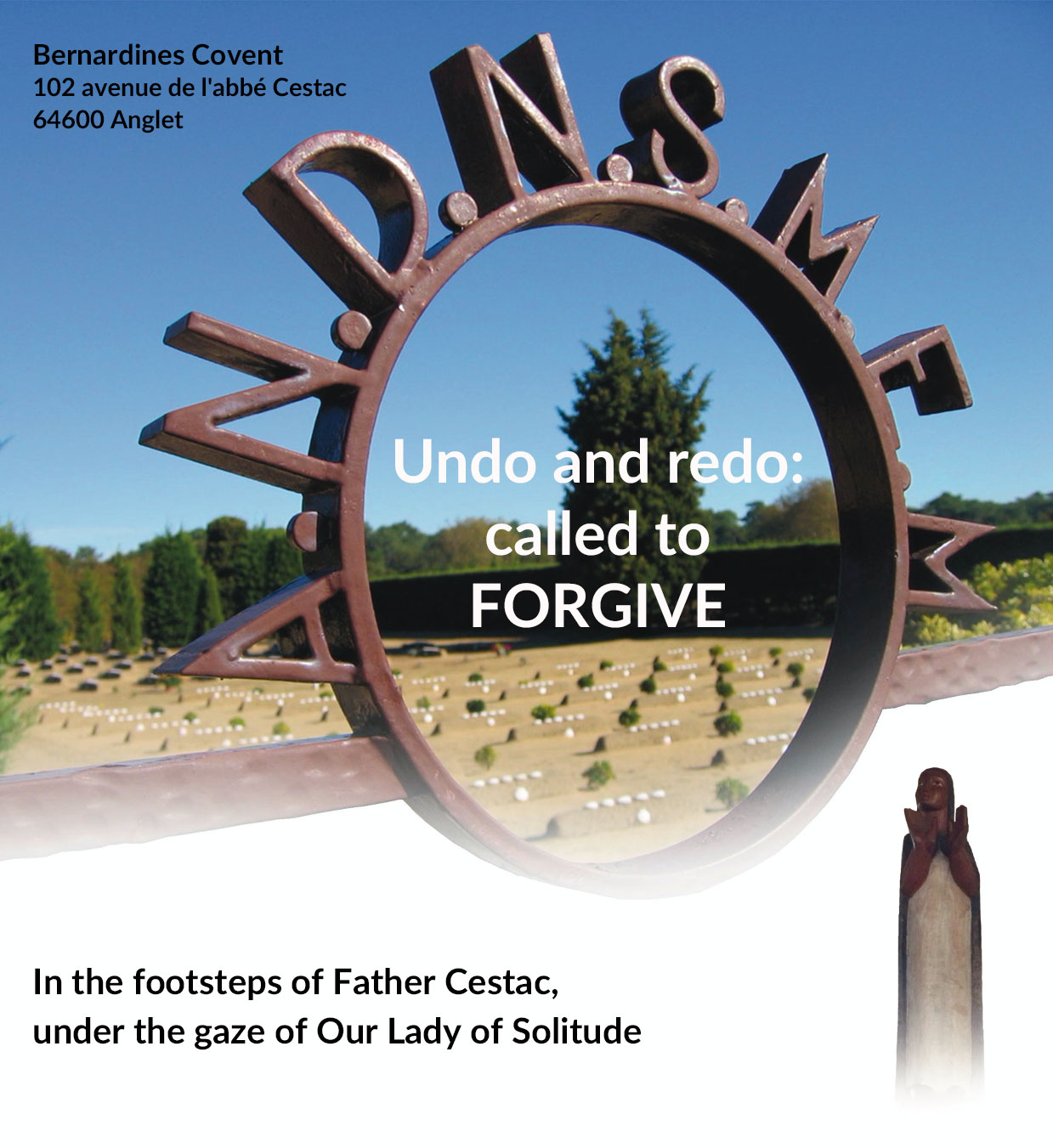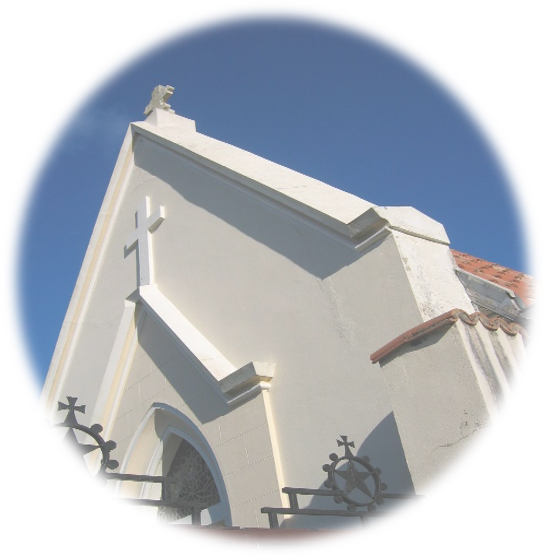
Undo and redo: Forgiveness
Undo and Redo refaire: called to forgive
Undo
- The time of Research : undo our preconceptions about forgiveness
"It would be more conformity with the spirit of our divine Mother to use more charity and moderation for all those who have done wrong to us." (Father Cestac)
Definition: Attitude reflects the heart's ability to give up taking revenge for an offense and to favor love over revenge. Forgiveness is often misunderstood even by Christians.
Forgiveness is a Christian requirement. This reality is so central to the Christian faith that there is in the Churches of Catholics, Orthodox and Anglicans, the sacrament of penance and reconciliation which makes it possible to forgive sins. Forgiveness is a part of prayer in the Our Father (Mt 6: 9-13) and in the profession of Catholic faith, the creed. In the gospel often we see Christ forgives or reminds of the importance of forgiveness: the sinner (Luke 7; 36-50), the parable of the prodigal son (Luke 15, 11-32), Jesus on the Cross (Luke 23; 34).
- Forgiveness is not deserved: forgiveness is a grace
It's beyond our human comprehension. However, Peace is only possible at the cost of forgiveness..
"Forgive, if you want it to be forgiven yourself." (Jean Chrysostome - Homilies, selected speeches and letters, 1785)
We have to sacrifice the pride, the self-pity and the desire for justice. We live in a society that tells us to do everything in our power to defend our rights. Human forgiveness is a grace, like divine forgiveness. The offender does not have to "deserve" it as we do not deserve God's forgiveness. The repentance of the offender is not a price he has to pay for us to forgive him. We cannot demand that our offender deserves our forgiveness nor be sure that he won`t hurt us again. Let's go to our offender or the person we have offended, without expecting anything.
- Forgiveness is not a feeling, it is a choice of will
To forgive is to choose not to hold it against the other. Some will say, "I cannot forgive." The first question is not to be able (it is the power of God) but about wanting. When we choose to forgive those who hurt us, we are removing the power they have over us.
As long as we resist the decision to forgive, we resist God, who cannot help us because the refusal to forgive gives us torment.
The parable of the ruthless servant in Matthew 18: 23-35 ends in torment. The master delivers the merciless servant to the executioners who refuse to forgive and to offer the grace he himself has received.
Who are the torturers who torment those who do not forgive? They are the bitterness, hatred, resentment, the desire for revenge, self-pity, the spirit of judgment ... "This is how my heavenly Father will treat you if you do not forgive." We are delivered to torments. We are trapped in these thoughts and feelings that we do not want to give up. Initially, these walls that we put up in front of the person who injured us, will provide some protection, but little by little we will build our own prison with our torments.
The right attitude means I choose to forgive and so I choose to no longer maintain my suffering. "Forgiveness is a characteristic of the brave man." (Gandhi - Letters to the Ashram, 1937)
Forgiveness requires courage and determination. "Look deep inside of you, you will find the strength you need. Forgiveness is an option of the heart which goes against the spontaneous instinct to return evil for evil." (John-Paul II)
Even if we want to, often we don't know how to forgive. In His grace, God is ready to help us and grant us forgiveness. "Where sin has abounded grace has abounded." (Romans 5, 20). God's grace is stronger, greater than sin. Let us not wait for justice to be done. Our forgiveness triggers the act of justice from God. "Goodness and mercy are the true justice of man, because he himself is constantly in need of indulgence and forgiveness." (Auguste Guyard, 1808-1882 - Quintessences, 1847)
- Forgiveness is not forgotten, it is going beyond
God forgives by forgetting. Scripture says that God will no longer remember our sins.
"For I will forgive their iniquity, I will no longer remember their sin." (Epistle to the Hebrews 10,17 and Jeremiah 31,34)
"What God is like you, who forgives iniquity and forgets the sins of the rest of your inheritance? He does not keep his anger forever, because he takes pleasure in mercy. He will have compassion on us, he will put under his feet our iniquities, and thou shall cast all their sins to the bottom of the sea." (Micah 7, 18)
On the other hand, the man forgives by keeping the memory. He is not the master of oblivion. It is a difficult and saving act. "If you don't forgive, you won't be forgiven."
Indeed, the first person to whom we do the good in forgiving is by ourselves. If our offender asks for forgiveness, it is of course easier to forgive, but if he does not ask, what do we do with the offense? Are we going to let it become infected in us and distill it`s poison? What if he refuses our forgiveness? The process of forgiveness, often long and difficult, consists in placing the offense outside of us, without waiting for the other to accept this forgiveness.
If I do not forgive, I remain a prisoner of the offense and my suffering. Forgiveness frees! "Forgiveness does not make you forget the past, but broadens the future." (Paul Boese, 1923-1976 - Forgiveness)
"To forgive an insult received, it is to heal ourselves the wound of our heart." (Saint Vincent de Paul - Les maximes spirituelles, posthume, 1576)
- Time for Personal reflection: what must I undo in myself to better forgive?
- Since the forgiveness is not deserved, what paralyzes me?
- Since forgiveness is not a feeling, what prevents me from wanting to give it or receive it?
- Since forgiveness is not forgetting, what must I do to go beyond in myself to forgive?
"Be kind to one another have a heart full of tenderness. Forgive one another as God has forgiven us in Christ." (Ephesians 4 - 32)
Father Cestac also invites us to forgive: "Would you not like to count on the kindness and the charity towards you? Do what you want us to do for you."
Mercy is the source of forgiveness. God the Father fully manifests it. Pope Francis writes: "Mercy is the ultimate and supreme act by which God comes to meet us. It is the path that unites God and man so that he opens his heart to the hope of being loved forever, despite the limits of our sin." He underlines that "the Church is not there to condemn, but to allow the encounter with this visceral love which is the mercy of God. She must not close her door to anyone."
"Through his word, his gestures and his whole person, Jesus is the face of the Father's kindness." (Father Cestac)
"The man who forgives or asks for forgiveness understands that there is a truth greater than him." (John-Paul II)
"You are what you create. Do you want to know happiness? So send the thoughts of love, of forgiveness on your past. Do not let the boat of your soul drift on the ocean of hatredness and storms. Seek peace in your heart and let it anchor you." (Babacar Khane, born in Dakar in 1935, author and teacher of Egyptian yoga)
Forgiveness is a necessity for living and being happy. Forgiveness transforms us, it transforms our relationships and our life. To forgive does not mean to deny the wounds of the past, but rather than feeling these pains continuously, to keep them in us, to live them still, it makes it possible to get rid of the energy and the force of the anger which is in us. It’s a great relief, liberation, a renewal.
Redo
- Enlightening: "Choose LIFE"
Father Cestac shows us the loving kindness of God: "It is a Good Father that the Good Lord. He only asks us for our heart and, provided that we give it to him sincerely and without reserve, he is ready to forget, to forgive, to erase forever all the faults of which we are guilty, even if they are more multiplied than the grains of sand at the shore of the sea." (letter of May 23, 1819)
- Are we ready to choose Life?
I take the risk of getting out of myself, to die myself to be born again, I leave the dress of my sadness, I join the other where she is, without seeking to change her. It doesn't belong to me.
"Choose life." (Deuteronomy 30, 15-19)
"I have come so that you may have life and have it in abundance." (John 10, 10)
To forgive is to let ourselves to be disturbed to choose life. Indeed, "mortal" sin is one that kills life. Let us be convinced that God never separates from us, but that we who cut ourselves off from Him by obstructing His Love and Life.
Sin is to let oneself be caught by habit, by routine, by knowledge, which becomes to us not knowledge, it means new birth... We get caught up in devouring life, we let ourselves go without thinking for oneself...we let ourselves go without seeing clearly "you have eyes to see and you do not see", Jesus Christ tells us again, "you have ears, and you can't hear”. Letting not yourself to go and discover anything new, letting not to changes, being installed...we are so good being together, not being moved, all that there is no longer life. Don't let yourself be "di-sengaged”. We were so tidy...it bothers me, it takes me out of my little life, I had found my rhythm, my cruising speed...
- Are we ready to rebuild our relationships?
- Principe 1: do not condemn
What do we know about what lies behind the misery, worry, hope, waiting for the person who offended us?
"If someone offends you, see only his misfortune and pray for him." (Father Cestac)
- Principe 2: God is Love
The adulterous woman "Go and do not sin again." (John 8, 1-11)
God is Love, that’s why he doesn’t condemn the sinner. He wants him to live. By not condemning, Jesus creates. God is not against man but for the man he created out of love.
God gives LIFE, this is why he invites us to leave our ego to turn entirely to Him, that means, turn also towards others, because God and man are one. Jesus sends the woman home, alive, encouraging her to stop sinning.
- Principe 3: against, beside, with
How did I get in touch with?
If I walk "against", I sow division.
If I walk "next door", I create loneliness.
If I walk "with", I allow life.
Cf. "Un être nouveau pour un monde nouveau" by Marguerite Hoppenot.
- Are we ready to give our answer as a child of God?
We are his beloved children, are we ready to say “yes” to become a son / daughter of God? Do I recognize and accept this filial relationship for a living?
"Watch over your heart more than anything else because it is from him that springs the sources of life." (Pr 4, 23)
"Rise, take up your bed and go home." (Mt 9,6)
"Man seeks happiness: he wants to be happy. Everything he does, his work, his steps, his privations, everything has as its goal this one and only end ... God doesn`t do anything useless. The man delivered to his freedom, enlightened by reason and much more by faith, can examine the various ways of life, decide on the one that is best suited." (Father Cestac - letter to Élise, November 16, 1828)
Sinners, we need to be forgiven and also to forgive. Only the logic of love can make us understand what God's forgiveness is. To forgive is not essentially to put back the fault, it is to give back love, to get back in a positive attitude of the heart towards others and to know that you are forgiven is to be assured of being loved.
God's forgiveness depends on us because it involves the positive process by which, opening our hearts again, our life is reconnected to the creative and unifying power of divine Love.
- Personal time for reflection
I choose Life, I undertake to rebuild my relationships, I agree to say "yes" to the one who is my Father and who only wants my happiness.
I now understand that the call to “forgive” and to “love” is the one, and that the whole adventure of my life to be called, following Jesus Christ, to "be love."
Let us allow ourselves to be touched by the patience of God who ends up overcoming our faults, our wanderings and our contradictions.
I can reread my life and note the signs of his kindness towards me.
"The story of every soul is only the story of the Lord's goodness to us." (Father Cestac)
- Time for Sharing
Based on our research and in the light of the Word and the proposed texts, let us take the time to reflect on our questions, our discoveries.
After doing this, can I clarify what does it mean to receive forgiveness, to give forgiveness? Why is it so important to forgive? What do these attitudes call me to?
Let us personally take the decision to forgive ourselves, the other...
- Prayer

Lord, who commanded us to love one another as you have loved us, let us discover the secret of entering into communion with the fellow being whom you give us to love…
Lord, discover the secret of this love that overturns the walls, that puts an end to solitudes, that melts everything into one and that gives peace. This secret of your love, give it to us Lord!
- The first step to receive the Grace
"Father, we know, reconciliation and forgiveness can only come from You.
So grant us the grace of forgiveness, the strength to reconcile with those who are under our roof, with those who are far away.
Make us even love our enemies. Do not allow the sun to set with a grudge or anger in our hearts.
Give us the grace of the first step and we will be like you."
(Cardinal Danneels, on the occasion of JPII's trip to Belgium, 1985)
- Guidelines for the Reconciliation
"Teach them and make them understand that the penance which is most pleasing to the Lord is that sanctifies others by the usual practice of humility, modesty, gentleness, daily work according to the rules and all these things animated by a great love for our Lord and a tender devotion to Our Lady and our Good Mother." (Father Cestac - letter July 27, 1839)
Let's choose a text to take the time to listen to the Word of God. This moment of preparation can also be a time to encourage us to re-read our spiritual, family, professional and social life.
Let us place ourselves under the gaze of God with simplicity and let us go back and see our last decisions, our meetings, our internal struggles ... What Jesus would have did in my place? That's the right question!
Its enough to focus on two or three essential things that we regret. Our approach must be sincere.
Confession means placing our hearts in the Heart of Christ so that He may transform it by His power.
"Lord, I know that I am fragile, that I am weak, that I fall often, but You by your mercy, take care of my fragility, protect my weakness, show me what are the resolutions that I must take to signify my willingness to please you."
Directed in March 2020, by Sister Annie Houssin, Marie-Laure Chaperon and Arielle Serveille, with the kind participation of the Father Patrick Moulié, Betharramite chaplain at Bernardines Convent, Congregation of the Servants of Mary, Anglet, France.